# Practice Tests
## Table of Contents
- [Practice Test 1](#Practice Test 1)
## Practice Test 1
*What does this curved arrow road marking mean?*
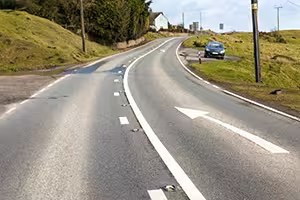 Overtaking traffic should move back to the left
*You're in a built-up area at night and the road is well lit. Why should you use dipped headlights?*
So that you can be easily seen by others
*You wish to turn right ahead. Why should you take up the correct position in good time?*
To help other road users know what you intend to do
*What should you do when you're approaching traffic lights that have red and amber showing together?*
Wait for the green light
*What should you do if the vehicle starts reversing off the driveway?*
Overtaking traffic should move back to the left
*You're in a built-up area at night and the road is well lit. Why should you use dipped headlights?*
So that you can be easily seen by others
*You wish to turn right ahead. Why should you take up the correct position in good time?*
To help other road users know what you intend to do
*What should you do when you're approaching traffic lights that have red and amber showing together?*
Wait for the green light
*What should you do if the vehicle starts reversing off the driveway?*
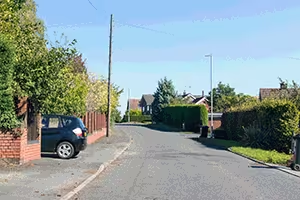 Sound your horn and be prepared to stop
*Which instrument-panel warning light would show that headlights are on main beam?*
Sound your horn and be prepared to stop
*Which instrument-panel warning light would show that headlights are on main beam?*
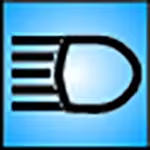 *What should you do when you move off from behind a parked car?*
Look around before moving of
*You're driving on an open road in dry weather. What distance should you keep from the vehicle in front?*
A two-second time gap
*You're driving towards a zebra crossing. What should you do if a person in a wheelchair is waiting to cross?*
Be prepared to stop
*What should you do when you're passing loose sheep on the road?*
Go very slowly
*What part of the car does the law require you to keep in good condition?*
The seat belts
*You're driving towards this left-hand bend. What danger should you be anticipating?*
*What should you do when you move off from behind a parked car?*
Look around before moving of
*You're driving on an open road in dry weather. What distance should you keep from the vehicle in front?*
A two-second time gap
*You're driving towards a zebra crossing. What should you do if a person in a wheelchair is waiting to cross?*
Be prepared to stop
*What should you do when you're passing loose sheep on the road?*
Go very slowly
*What part of the car does the law require you to keep in good condition?*
The seat belts
*You're driving towards this left-hand bend. What danger should you be anticipating?*
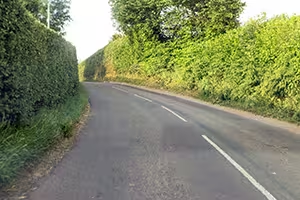 Pedestrians walking towards you
*At an incident, someone is suffering from severe burns. How could you help them?*
Douse the burns with clean, cool water
*Which sign means 'no stopping'?*
Pedestrians walking towards you
*At an incident, someone is suffering from severe burns. How could you help them?*
Douse the burns with clean, cool water
*Which sign means 'no stopping'?*
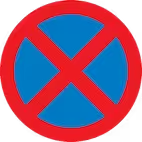 *What does this sign mean?*
*What does this sign mean?*
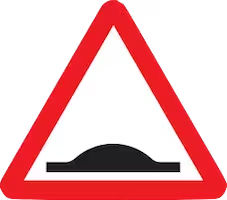 Humps in the road
*You're looking for somewhere to park your vehicle. Neither you or your passenger are disabled. What should you do if the only free spaces are marked for disabled drivers?*
Wait for a regular parking space to become free
*Why is it important to make full use of the slip road as you join a motorway?*
To allow you to fit safely into the traffic flow in the left-hand lane
*How should you dispose of a used vehicle battery?*
Take it to a local-authority disposal site
*What colour are the reflective studs between a motorway and a slip road?*
Green
*You're approaching traffic lights and the red light is showing. What signal will show next?*
Red and amber
*You're following a long vehicle approaching a crossroads. What should you do if the driver signals right but moves close to the left-hand kerb?*
Wait behind the long vehicle
*Why is it dangerous to travel too close to the vehicle ahead?*
Your view of the road ahead will be restricted
*You wish to tow a trailer. Where would you find the maximum noseweight for your vehicle's tow hitch?*
In the vehicle handbook
*What should you do when you park at night on a road that has a 40 mph speed limit?*
Leave parking lights switched on
*What's the main benefit of driving a four-wheel-drive vehicle?*
Improved grip on the road
*You're going to turn left from a main road into a minor road. What should you do as you approach the junction?*
Keep well to the left of the road
*Following a collision, a person has been injured. What would be a warning sign for shock?*
Rapid shallow breathing
*What should you do if your anti-lock brakes (ABS) warning light stays on?*
Have the brakes checked immediately
*You're approaching a roundabout. What should you do if a cyclist ahead is signalling to turn right?*
Give the cyclist plenty of room
*When would you use the right-hand lane on a three-lane motorway?*
When you're overtaking
*You take some cough medicine given to you by a friend. What should you do before driving your car?*
Check the label to see if the medicine will affect your driving
*What should you do as you approach this lorry?*
Humps in the road
*You're looking for somewhere to park your vehicle. Neither you or your passenger are disabled. What should you do if the only free spaces are marked for disabled drivers?*
Wait for a regular parking space to become free
*Why is it important to make full use of the slip road as you join a motorway?*
To allow you to fit safely into the traffic flow in the left-hand lane
*How should you dispose of a used vehicle battery?*
Take it to a local-authority disposal site
*What colour are the reflective studs between a motorway and a slip road?*
Green
*You're approaching traffic lights and the red light is showing. What signal will show next?*
Red and amber
*You're following a long vehicle approaching a crossroads. What should you do if the driver signals right but moves close to the left-hand kerb?*
Wait behind the long vehicle
*Why is it dangerous to travel too close to the vehicle ahead?*
Your view of the road ahead will be restricted
*You wish to tow a trailer. Where would you find the maximum noseweight for your vehicle's tow hitch?*
In the vehicle handbook
*What should you do when you park at night on a road that has a 40 mph speed limit?*
Leave parking lights switched on
*What's the main benefit of driving a four-wheel-drive vehicle?*
Improved grip on the road
*You're going to turn left from a main road into a minor road. What should you do as you approach the junction?*
Keep well to the left of the road
*Following a collision, a person has been injured. What would be a warning sign for shock?*
Rapid shallow breathing
*What should you do if your anti-lock brakes (ABS) warning light stays on?*
Have the brakes checked immediately
*You're approaching a roundabout. What should you do if a cyclist ahead is signalling to turn right?*
Give the cyclist plenty of room
*When would you use the right-hand lane on a three-lane motorway?*
When you're overtaking
*You take some cough medicine given to you by a friend. What should you do before driving your car?*
Check the label to see if the medicine will affect your driving
*What should you do as you approach this lorry?*
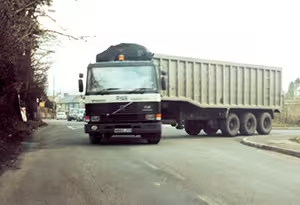 *You're carrying an 11-year-old child on the front seat of your car. They're under 1.35 metres (4 feet 5 inches) tall. What seat belt security must be in place?*
They must use a suitable child restraint
*What shape are traffic signs giving orders?*
*You're carrying an 11-year-old child on the front seat of your car. They're under 1.35 metres (4 feet 5 inches) tall. What seat belt security must be in place?*
They must use a suitable child restraint
*What shape are traffic signs giving orders?*
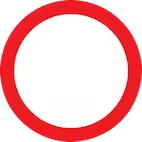 *What should you do if you think the driver of the vehicle in front has forgotten to cancel their right indicator?*
Stay behind and don't overtake
*Why should you allow extra room while overtaking a motorcyclist on a windy day?*
The rider may bee blown in front of you
*Which colour follows the green signal at a puffin crossing?*
Steady amber
*You've just passed your first practical driving test. What will you have to do if you get six penalty points on your licence in the next two years?*
Retake your theory and practical tests
*How should you use anti-lock brakes when you need to stop in an emergency?*
Brake promptly and firmly until you've stopped
*You're following two cyclists as they approach a roundabout in the left-hand lane. Where would you expect the cyclists to go?*
Any direction
*What could you do to help injured people at an incident?*
Keep them warm and comfortable
*What should you do when you leave your car unattended for a few minutes?*
Lock it and remove the key
*You're driving on the motorway in windy conditions. What should you do as you overtake a high-sided vehicle?*
Be wary of a sudden gust
What does this sign mean?
*What should you do if you think the driver of the vehicle in front has forgotten to cancel their right indicator?*
Stay behind and don't overtake
*Why should you allow extra room while overtaking a motorcyclist on a windy day?*
The rider may bee blown in front of you
*Which colour follows the green signal at a puffin crossing?*
Steady amber
*You've just passed your first practical driving test. What will you have to do if you get six penalty points on your licence in the next two years?*
Retake your theory and practical tests
*How should you use anti-lock brakes when you need to stop in an emergency?*
Brake promptly and firmly until you've stopped
*You're following two cyclists as they approach a roundabout in the left-hand lane. Where would you expect the cyclists to go?*
Any direction
*What could you do to help injured people at an incident?*
Keep them warm and comfortable
*What should you do when you leave your car unattended for a few minutes?*
Lock it and remove the key
*You're driving on the motorway in windy conditions. What should you do as you overtake a high-sided vehicle?*
Be wary of a sudden gust
What does this sign mean?
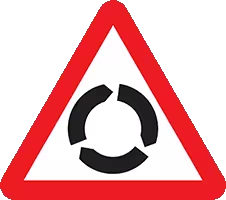 Roundabout
*You're on a motorway. What does it mean if a red cross is showing above the hard shoulder and mandatory speed limits above all other lanes?*
*How can you use your vehicle's engine to control your speed?*
By changing to a lower gear
*Why is there a warning 'Reduce speed now'?*
There's a crossroads and a double bend ahead. You'll see a sign warning you to slow down when you're approaching a part of the road where you need to be especially careful. For example, as you approach a roundabout, a crossroads or a bend. If you're travelling on a major road and coming up to a junction with a minor road, you should slow down - even if you don't want to turn. This is because another driver at the junction may not be able to see clearly and they could pull out in front of you.
*Why has the line in the centre of the road changed?*
To warn of hazards ahead. The broken white line marks the boundary between lanes on your side of the dual carriageway. But when the lines start to lengthen, with shorter gaps, this warns you of a hazard coming up - like a sharp bend.
*The driver towing the caravan wants to turn right onto the dual carriageway. What should they do?*
Wait until the road is clear in both directions before turning
Roundabout
*You're on a motorway. What does it mean if a red cross is showing above the hard shoulder and mandatory speed limits above all other lanes?*
*How can you use your vehicle's engine to control your speed?*
By changing to a lower gear
*Why is there a warning 'Reduce speed now'?*
There's a crossroads and a double bend ahead. You'll see a sign warning you to slow down when you're approaching a part of the road where you need to be especially careful. For example, as you approach a roundabout, a crossroads or a bend. If you're travelling on a major road and coming up to a junction with a minor road, you should slow down - even if you don't want to turn. This is because another driver at the junction may not be able to see clearly and they could pull out in front of you.
*Why has the line in the centre of the road changed?*
To warn of hazards ahead. The broken white line marks the boundary between lanes on your side of the dual carriageway. But when the lines start to lengthen, with shorter gaps, this warns you of a hazard coming up - like a sharp bend.
*The driver towing the caravan wants to turn right onto the dual carriageway. What should they do?*
Wait until the road is clear in both directions before turning
 Overtaking traffic should move back to the left
*You're in a built-up area at night and the road is well lit. Why should you use dipped headlights?*
So that you can be easily seen by others
*You wish to turn right ahead. Why should you take up the correct position in good time?*
To help other road users know what you intend to do
*What should you do when you're approaching traffic lights that have red and amber showing together?*
Wait for the green light
*What should you do if the vehicle starts reversing off the driveway?*
Overtaking traffic should move back to the left
*You're in a built-up area at night and the road is well lit. Why should you use dipped headlights?*
So that you can be easily seen by others
*You wish to turn right ahead. Why should you take up the correct position in good time?*
To help other road users know what you intend to do
*What should you do when you're approaching traffic lights that have red and amber showing together?*
Wait for the green light
*What should you do if the vehicle starts reversing off the driveway?*
 Sound your horn and be prepared to stop
*Which instrument-panel warning light would show that headlights are on main beam?*
Sound your horn and be prepared to stop
*Which instrument-panel warning light would show that headlights are on main beam?*
 *What should you do when you move off from behind a parked car?*
Look around before moving of
*You're driving on an open road in dry weather. What distance should you keep from the vehicle in front?*
A two-second time gap
*You're driving towards a zebra crossing. What should you do if a person in a wheelchair is waiting to cross?*
Be prepared to stop
*What should you do when you're passing loose sheep on the road?*
Go very slowly
*What part of the car does the law require you to keep in good condition?*
The seat belts
*You're driving towards this left-hand bend. What danger should you be anticipating?*
*What should you do when you move off from behind a parked car?*
Look around before moving of
*You're driving on an open road in dry weather. What distance should you keep from the vehicle in front?*
A two-second time gap
*You're driving towards a zebra crossing. What should you do if a person in a wheelchair is waiting to cross?*
Be prepared to stop
*What should you do when you're passing loose sheep on the road?*
Go very slowly
*What part of the car does the law require you to keep in good condition?*
The seat belts
*You're driving towards this left-hand bend. What danger should you be anticipating?*
 Pedestrians walking towards you
*At an incident, someone is suffering from severe burns. How could you help them?*
Douse the burns with clean, cool water
*Which sign means 'no stopping'?*
Pedestrians walking towards you
*At an incident, someone is suffering from severe burns. How could you help them?*
Douse the burns with clean, cool water
*Which sign means 'no stopping'?*
 *What does this sign mean?*
*What does this sign mean?*
 Humps in the road
*You're looking for somewhere to park your vehicle. Neither you or your passenger are disabled. What should you do if the only free spaces are marked for disabled drivers?*
Wait for a regular parking space to become free
*Why is it important to make full use of the slip road as you join a motorway?*
To allow you to fit safely into the traffic flow in the left-hand lane
*How should you dispose of a used vehicle battery?*
Take it to a local-authority disposal site
*What colour are the reflective studs between a motorway and a slip road?*
Green
*You're approaching traffic lights and the red light is showing. What signal will show next?*
Red and amber
*You're following a long vehicle approaching a crossroads. What should you do if the driver signals right but moves close to the left-hand kerb?*
Wait behind the long vehicle
*Why is it dangerous to travel too close to the vehicle ahead?*
Your view of the road ahead will be restricted
*You wish to tow a trailer. Where would you find the maximum noseweight for your vehicle's tow hitch?*
In the vehicle handbook
*What should you do when you park at night on a road that has a 40 mph speed limit?*
Leave parking lights switched on
*What's the main benefit of driving a four-wheel-drive vehicle?*
Improved grip on the road
*You're going to turn left from a main road into a minor road. What should you do as you approach the junction?*
Keep well to the left of the road
*Following a collision, a person has been injured. What would be a warning sign for shock?*
Rapid shallow breathing
*What should you do if your anti-lock brakes (ABS) warning light stays on?*
Have the brakes checked immediately
*You're approaching a roundabout. What should you do if a cyclist ahead is signalling to turn right?*
Give the cyclist plenty of room
*When would you use the right-hand lane on a three-lane motorway?*
When you're overtaking
*You take some cough medicine given to you by a friend. What should you do before driving your car?*
Check the label to see if the medicine will affect your driving
*What should you do as you approach this lorry?*
Humps in the road
*You're looking for somewhere to park your vehicle. Neither you or your passenger are disabled. What should you do if the only free spaces are marked for disabled drivers?*
Wait for a regular parking space to become free
*Why is it important to make full use of the slip road as you join a motorway?*
To allow you to fit safely into the traffic flow in the left-hand lane
*How should you dispose of a used vehicle battery?*
Take it to a local-authority disposal site
*What colour are the reflective studs between a motorway and a slip road?*
Green
*You're approaching traffic lights and the red light is showing. What signal will show next?*
Red and amber
*You're following a long vehicle approaching a crossroads. What should you do if the driver signals right but moves close to the left-hand kerb?*
Wait behind the long vehicle
*Why is it dangerous to travel too close to the vehicle ahead?*
Your view of the road ahead will be restricted
*You wish to tow a trailer. Where would you find the maximum noseweight for your vehicle's tow hitch?*
In the vehicle handbook
*What should you do when you park at night on a road that has a 40 mph speed limit?*
Leave parking lights switched on
*What's the main benefit of driving a four-wheel-drive vehicle?*
Improved grip on the road
*You're going to turn left from a main road into a minor road. What should you do as you approach the junction?*
Keep well to the left of the road
*Following a collision, a person has been injured. What would be a warning sign for shock?*
Rapid shallow breathing
*What should you do if your anti-lock brakes (ABS) warning light stays on?*
Have the brakes checked immediately
*You're approaching a roundabout. What should you do if a cyclist ahead is signalling to turn right?*
Give the cyclist plenty of room
*When would you use the right-hand lane on a three-lane motorway?*
When you're overtaking
*You take some cough medicine given to you by a friend. What should you do before driving your car?*
Check the label to see if the medicine will affect your driving
*What should you do as you approach this lorry?*
 *You're carrying an 11-year-old child on the front seat of your car. They're under 1.35 metres (4 feet 5 inches) tall. What seat belt security must be in place?*
They must use a suitable child restraint
*What shape are traffic signs giving orders?*
*You're carrying an 11-year-old child on the front seat of your car. They're under 1.35 metres (4 feet 5 inches) tall. What seat belt security must be in place?*
They must use a suitable child restraint
*What shape are traffic signs giving orders?*
 *What should you do if you think the driver of the vehicle in front has forgotten to cancel their right indicator?*
Stay behind and don't overtake
*Why should you allow extra room while overtaking a motorcyclist on a windy day?*
The rider may bee blown in front of you
*Which colour follows the green signal at a puffin crossing?*
Steady amber
*You've just passed your first practical driving test. What will you have to do if you get six penalty points on your licence in the next two years?*
Retake your theory and practical tests
*How should you use anti-lock brakes when you need to stop in an emergency?*
Brake promptly and firmly until you've stopped
*You're following two cyclists as they approach a roundabout in the left-hand lane. Where would you expect the cyclists to go?*
Any direction
*What could you do to help injured people at an incident?*
Keep them warm and comfortable
*What should you do when you leave your car unattended for a few minutes?*
Lock it and remove the key
*You're driving on the motorway in windy conditions. What should you do as you overtake a high-sided vehicle?*
Be wary of a sudden gust
What does this sign mean?
*What should you do if you think the driver of the vehicle in front has forgotten to cancel their right indicator?*
Stay behind and don't overtake
*Why should you allow extra room while overtaking a motorcyclist on a windy day?*
The rider may bee blown in front of you
*Which colour follows the green signal at a puffin crossing?*
Steady amber
*You've just passed your first practical driving test. What will you have to do if you get six penalty points on your licence in the next two years?*
Retake your theory and practical tests
*How should you use anti-lock brakes when you need to stop in an emergency?*
Brake promptly and firmly until you've stopped
*You're following two cyclists as they approach a roundabout in the left-hand lane. Where would you expect the cyclists to go?*
Any direction
*What could you do to help injured people at an incident?*
Keep them warm and comfortable
*What should you do when you leave your car unattended for a few minutes?*
Lock it and remove the key
*You're driving on the motorway in windy conditions. What should you do as you overtake a high-sided vehicle?*
Be wary of a sudden gust
What does this sign mean?
 Roundabout
*You're on a motorway. What does it mean if a red cross is showing above the hard shoulder and mandatory speed limits above all other lanes?*
*How can you use your vehicle's engine to control your speed?*
By changing to a lower gear
*Why is there a warning 'Reduce speed now'?*
There's a crossroads and a double bend ahead. You'll see a sign warning you to slow down when you're approaching a part of the road where you need to be especially careful. For example, as you approach a roundabout, a crossroads or a bend. If you're travelling on a major road and coming up to a junction with a minor road, you should slow down - even if you don't want to turn. This is because another driver at the junction may not be able to see clearly and they could pull out in front of you.
*Why has the line in the centre of the road changed?*
To warn of hazards ahead. The broken white line marks the boundary between lanes on your side of the dual carriageway. But when the lines start to lengthen, with shorter gaps, this warns you of a hazard coming up - like a sharp bend.
*The driver towing the caravan wants to turn right onto the dual carriageway. What should they do?*
Wait until the road is clear in both directions before turning
Roundabout
*You're on a motorway. What does it mean if a red cross is showing above the hard shoulder and mandatory speed limits above all other lanes?*
*How can you use your vehicle's engine to control your speed?*
By changing to a lower gear
*Why is there a warning 'Reduce speed now'?*
There's a crossroads and a double bend ahead. You'll see a sign warning you to slow down when you're approaching a part of the road where you need to be especially careful. For example, as you approach a roundabout, a crossroads or a bend. If you're travelling on a major road and coming up to a junction with a minor road, you should slow down - even if you don't want to turn. This is because another driver at the junction may not be able to see clearly and they could pull out in front of you.
*Why has the line in the centre of the road changed?*
To warn of hazards ahead. The broken white line marks the boundary between lanes on your side of the dual carriageway. But when the lines start to lengthen, with shorter gaps, this warns you of a hazard coming up - like a sharp bend.
*The driver towing the caravan wants to turn right onto the dual carriageway. What should they do?*
Wait until the road is clear in both directions before turning